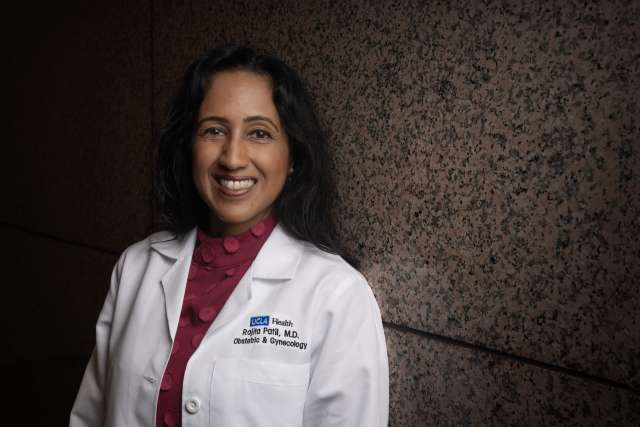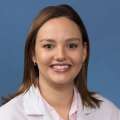Menopause is a natural part of aging that happens to everyone with ovaries. As such, it affects half the population, typically around middle age.
Yet many medical trainees receive little to no instruction about menopause or how to help patients navigate the effects of the hormonal changes that characterize the menopause transition. A 2019 study found that 20% of family medicine, internal medicine and obstetrics and gynecology residents received no instruction about menopause.
“We don’t get enough training on this field in residency programs,” says Rajita Patil, MD, an obstetrician-gynecologist and director of the new Comprehensive Menopause Care program at UCLA Health. “I literally don’t remember a lecture on this in my residency program.”
So Dr. Patil set out to educate herself to better help her patients. She started attending The North American Menopause Society’s annual conference and ultimately became a Certified Menopause Practitioner through the organization.
“I was blown away by the amount I didn’t know,” she says.
While traveling home from the group’s 2021 conference, Dr. Patil had what she describes as an epiphany: UCLA Health needed to offer comprehensive menopause care. The health system ought to have more certified practitioners and leverage its expertise in cardiology, cognition, bone health, genitourinary health, sleep medicine, mental health and integrative medicine to provide meaningful care for some of the 1 million women in the U.S. who reach menopause each year.
She brought her ideas to Deborah Krakow, MD, chair of the Department of Obstetrics and Gynecology, who offered her full support. Two years later, Dr. Patil and two colleagues, Brittany Davis, MD and Erica Oberman, MD — all certified menopause providers — launched the Comprehensive Menopause Care program at UCLA Health. It’s the only program of its kind on the West Coast, Dr. Patil says.
A window of opportunity
“The whole foundation for this program lies on the basic idea that menopause represents a unique window of opportunity to really improve a person’s quality of life as they enter midlife and really optimize their longevity,” she says. “It’s not only about what’s happening to them short term, but it’s also what’s happening to a person from a long-term standpoint in their life, and we want to help them live their best life going forward.”
While menopause is just a moment in time, marking 12 months without a menstrual period, the years leading up to it bring significant hormonal changes that can affect well-being both during and after the menopause transition.
The average age of menopause is 51, but it can occur as early as one’s 40s or as late as their 60s. Menopause can also be caused in younger people by medications that affect ovarian health, such as chemotherapy, or surgical removal of the ovaries.
The rapid decline in estrogen that accompanies menopause “truly affects every part of the body,” Dr. Patil says, as there are estrogen receptors in every organ system.
In the short term, people may experience hot flashes, sleep and mood disturbances, cognitive issues such as brain fog, vaginal dryness and sexual health concerns. After menopause, people are at greater risk of bone loss and cardiovascular disease. But only about half of those with troubling menopause symptoms receive treatment, Dr. Patil says.
Part of the problem is patients’ reluctance to discuss menopause issues with their providers because of negative stigma around the transition, she says. The knowledge gap among physicians is the other half of the problem: “Providers don’t want to ask patients about what they don’t know how to treat.”
The Comprehensive Menopause Care program aims to address both challenges by creating a place where people can have a thorough consultation regarding their individual experience with menopause and where providers and trainees from different disciplines can learn more about how to care for these patients.
The new program has three arms, Dr. Patil says: Clinical care, education and research.
Whole-person care
People may want to seek care from the menopause program when they are in their late 40s and begin having irregular periods and menopausal symptoms, Dr. Patil says. Irregular periods are often the first sign of perimenopause, or the beginning of the menopause transition, which “can last six months to five years.”
Each new patient completes a comprehensive questionnaire that assesses symptoms in various organ systems. Clinical algorithms developed by Dr. Patil and her expert collaborators point to areas that may need attention so personalized care can be delivered.
“My vision is to provide evidence-based, comprehensive but individualized, whole-person care,” Dr. Patil says. “It’s really about putting the power in the patient’s hands after having the right information and the right understanding of their health so that they can make the best decisions for themselves.”
Not everyone needs hormone therapy, she adds. Different symptoms can benefit from different treatments, and some people’s symptoms may be more bothersome or concerning than others.
Hot flashes, for example, aren’t just uncomfortable and sleep-disrupting — they’re associated with more serious cardiovascular issues later in life.
“The more severe someone has hot flashes, the more frequent someone has hot flashes … we know there’s a direct correlation between that and the amount of cardiovascular disease a person’s going to have 10 years down the road,” Dr. Patil says. “That’s why we need to take hot flashes seriously, because they actually signify something going on in the blood vessels that is correlated with longer-term risk of cardiovascular disease.”
Bone loss is another serious issue, as bone density declines rapidly in perimenopause. Studies show hormone therapy can help, she says, but more research is needed to learn if it actually prevents future fractures.
The comprehensive menopause program also incorporates integrative medicine, drawing on mind-body-spirit techniques as complements to traditional medicine to alleviate menopause symptoms and improve quality of life.
“A person going through menopause deserves to understand and feel validated about what’s happening to them and their body during this time,” Dr. Patil says. “We hope our program will be a model for others to follow suit, so more people can get the care they truly deserve.”






